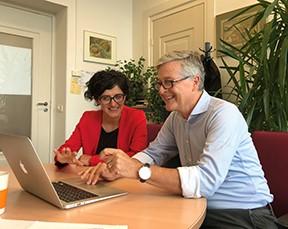Building on the interest generated over the past years an analysis of the emerging literature on frugal innovation is needed to unravel frugal innovation processes, identify frugal innovation patterns, and evaluate evidence on economic, environmental and social performance. The Centre for Frugal Innovation in Africa (CFIA) investigates this together with Research Partner Dr. Valentina de Marchi.
 De Marchi works for the department of Economics and Management at the University of Padova, one of the oldest universities in the world with a very long tradition in the study of innovation in the context of small-medium enterprises. Within this context De Marchi is specialized in the study of innovations that can diminish environmental impact. One of her main research interests relates to understanding why and how managers and entrepreneurs change the process within their companies to for example reduce CO2 emissions in manufacturing processes or develop new products out of recycled materials. ‘This process of how creativity can be applied for a goal for the good really intrigues me’, says De Marchi, who works on a meta-analysis of literature on Frugal Innovation together with Prof. dr. Peter Knorringa.
De Marchi works for the department of Economics and Management at the University of Padova, one of the oldest universities in the world with a very long tradition in the study of innovation in the context of small-medium enterprises. Within this context De Marchi is specialized in the study of innovations that can diminish environmental impact. One of her main research interests relates to understanding why and how managers and entrepreneurs change the process within their companies to for example reduce CO2 emissions in manufacturing processes or develop new products out of recycled materials. ‘This process of how creativity can be applied for a goal for the good really intrigues me’, says De Marchi, who works on a meta-analysis of literature on Frugal Innovation together with Prof. dr. Peter Knorringa.
Production processes
The two researchers know each other already for some time, and it was their shared interest in the global dimension of production processes and global value chains that raised the question ‘how can companies know about the environmental impacts of their products if they are not manufacturing all components themselves? How can a product be green and how can they assure their consumers of this fact?’. Starting from an environmental focus De Marchi got interested in learning more on frugal innovation which also involves and entails the social dimension of innovation. ‘Coming from an institution that is specialized in the study of SME’s, small and medium enterprises, it is interesting for me to learn about and to share experiences on frugal innovation as they are often realized by small firms, often in an informal setting. I see a lot of potential, benefits and complementarities between my own research, and that of other colleagues working at the department of economics and management.'
Frugal Innovation as a frontier
'The concept of frugal innovation started as a concept that was adapted mostly to understand innovation in a resource constrained context. But more and more we see that there is space for frugality in more developed countries', De Marchi explains. While it is not the mainstream focus of the research, or the companies that are studied, at the department of economics and management at Padova University there is quite an interest, also within the institution, in terms of looking at these new frontiers of innovation. Frugal Innovation is seen as a concept that could be very useful for generating new insights into the industrial texture about new developments and new ideas.
A meta-analysis of frugal innovation
How is frugal innovation effective? Is frugal innovation delivering positive outcomes? De Marchi and Knorringa realized that there have been a lot of studies on frugal innovation but these have focused on definitional issues and on presenting case studies. ‘While there are a lot of interesting literature reviews, they do not provide insight in understanding about what we think is a key question – what is the impact? The real impact of frugal innovation?’
Studying the impact of frugal innovations can be seen as a frontier in the frugality literature. Or rather, the research duo argues that the topic of impact has not yet been really investigated. Therefore, the aim of their meta-analysis is to systematize all the empirical cases and learn from India, Brazil, China, Kenya, Sweden and other countries. The goal is to learn from all these cases and try to understand the contingences. When is frugal innovation really delivering economic, environmental and social impact? And in what contexts are these impacts more likely to occur?
Preliminary findings
The research project team has been setting up the necessary data sources. So far, they see that, for example, different combinations of social, economic and environmental impacts are occurring. ‘At the moment we are evaluating what the most interesting elements are – given that we have a very large amount of data that we have collected. We are starting to understand how to shape the research, and how to push it forward.’ A first draft is under discussion and it is expected that the systematic literature review will be ready for publication by the summer.
The main research questions of this project are:
- What is the literature on Frugal Innovation focusing on?
- To what extent does the Frugal Innovation literature identify the economic, environmental and social impacts of frugal innovations? And what are these impacts?
- Is it possible to identify any patterns in what types of frugal innovations result in which types of impacts?
Interested in the meta-analysis research project on when frugal innovation is really working - and - in what context? Subscribe to our newsletter and you will keep you updated about CFIA research projects.
